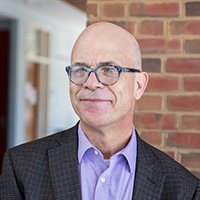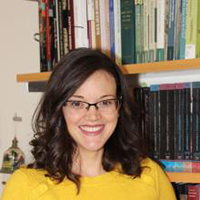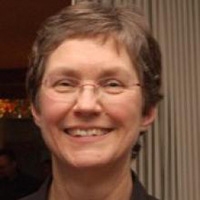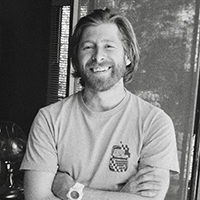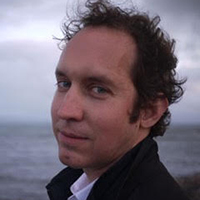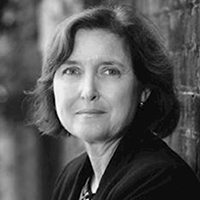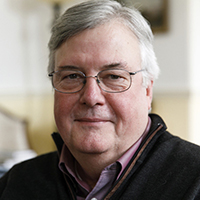The Advisory Committee, chaired by Alison Booth and appointed by the Dean of the College and Graduate School of Arts & Sciences, engages with the academic aspects of the Digital Humanities Certificate program, from admission and advising to evaluating portfolios and dossiers for graduation. Drawn from varied disciplines and schools, members of the committee often teach DH-related courses or supervise independent studies, theses, and dissertations.
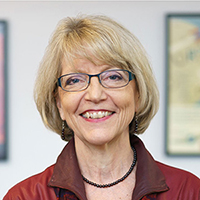
Alison Booth
Professor of English; Faculty Director, DHC | booth@virginia.edu
Professor of English and Academic Director of the Scholars’ Lab, University Library, Alison Booth offers the required Practicum course and elective courses for the Certificate. She has published books and articles in feminist literary history, literary tourism, narrative theory, and prosopography (or collective biography). Her Collective Biographies of Women project, developed in both Scholars’ Lab and IATH, has offered practicum hours for DH Certificate students. A current project on the Harlem Renaissance poet Anne Spencer and her house museum in Lynchburg, Virginia, unites digital textual studies and cultural heritage informatics/spatial humanities.
Rafael Alvarado
Associate Professor, School of Data Science | rca2t@virginia.edu
Rafael Alvarado is the Program Director of the M.S. in Data Science and an Associate Professor at the School of Data Science. His areas of research include digital humanities, text analytics, and the anthropology of information.
A digital humanist, Alvarado discovered data science when he realized he could combine his interests in human culture and quantitative methods. Prior to returning to UVA, Alvarado worked at Princeton University as a Coordinator of Humanities and Social Sciences Computing. There, he worked on several projects, including the Charrette Project, which digitized an Old French manuscript of an Arthurian legend, Chrétien de Troyes’ Knight of the Cart, which tells the story of Lancelot.
At the School of Data Science, Alvarado teaches courses on Exploratory Text Analytics and the Practice and Application of Data Science. He emphasizes the importance of ethics in data science to his students as they look to the future of data science. You can follow him on Twitter at @ontoligent.
Allison Bigelow
Tom Scully Discovery Chair and Associate Professor, Department of Spanish, Italian, and Portuguese | amb8fk@virginia.edu
Allison Bigelow's research and teaching focus on colonial science, Indigenous literacies, racial category making, and gender systems in the early Americas (1492-1700). At UVa, she is involved in two digital projects. Multepal (meaning "Joint Rule" in Classic Yukatek Maya), which she co-organizes with Rafael Alvarado of the Data Science Institute, is a thematic research collection for students and scholars of Mesoamerica. Their current focus is to create a digital critical edition of the Maya K'iche' book of creation, the Popol Wuj. Their edition allows readers to map characters, places, and technologies referenced in the text onto a network of historically-grounded topics that are reflective of Maya cosmovisions. You can find all of their works and works in progress here. A list of their publications and presentations is available here. Allison's second project involves migrating a database of language contact in 16th c. Peru from Lima to UVa, with help from Scholars' Lab. The site, built by Peruvian researchers Lydia Fossa, Diana Coronado, María Claudia Delgado, and Katherine López, is available here.
In addition to DH, Allison also teach classes in Spanish, Latin American Studies, and Indigenous Studies. She is especially interested in working with students in the intersections of these areas.
Edith Clowes
Brown-Forman Professor, Department of Slavic Languages and Literatures | eec3c@virginia.edu
Edith Clowes' research and writing spans the Russian intellectual-historical sphere, addressing Russian and comparative literary, philosophical, and social-aspirational interactions. Her teaching and research are both especially committed to fathoming the Russian utopian mind (i.e. what polity do Russians imagine for themselves?). For the last 15-20 years, embracing all these kinds of Russian writing, her focus has turned toward the question of “imagined geographies” in Russian writing culture. Specifically, the ways a cultural community envisions the cultural-geographical terrain which they claim as their own tells us a great deal about identity (who am I and where do I belong?) and mentality (what sets of values do I bring to major decision-making and to action plans?). In this area she has three books (Russia on the Edge (2011), Area Studies in the Global Age (2016), Russia's Regional Identities: The Power of the Provinces (2018) and a special number of the journal, Region (2016).
Over the last 6 years she has gained basic proficiency in digital literary cartography. Her first project was called “Russian Virginia,” which used free WordPress to map all Russian-related venues and businesses in Virginia. "Mapping Imagined Geographies of Revolutionary Russia (1914-1922)" is her second digital project. In 2014, she taught literary cartography at the University of Heidelberg. Since then, with research support from the Hoover Archives at Stanford University and UVA's IATH, she assembled the basic corpus of works (which will be expanding into the future as we gain access to rare works) and, working with the IATH team, we have built the database, repository, and web site for "Mapping Imagined Geographies of Revolutionary Russia (1914-1922)," which can be found here: http://maprr.iath.virginia.edu.
Kevin Driscoll
Assistant Professor, Department of Media Studies | ked5d@virginia.edu
Kevin Driscoll is an assistant professor in the Department of Media Studies where he specializes in technology, culture, and communication. His recent research and teaching examines alternative histories of the internet and the politics of amateur innovation. Driscoll is particularly excited about the challenges posed by ephemeral, distributed, and commercial communication systems such as dial-up BBSs, CB radio, and commercial online services like CompuServe and America On-Line.
Brad Pasanek
Mayo Neh Distinguished Teaching Professor, Department of English | bmp7e@virginia.edu
Brad Pasanek conducts research in eighteenth-century literature and the digital humanities, and is fascinated by literary form, intellectual history, distant reading, and commonplace books. Pasanek composed a dictionary of metaphors of mind that digests and analyzes examples collected in the database The Mind is a Metaphor. His most recent projects are concerned with soliloquy, poetic diction, puzzles, and citation.
Lisa Reilly
Commonwealth Professor in Architectural History, School of Architecture | lar2f@virginia.edu
Lisa Reilly's chief research interest is in medieval visual culture. Her most recent book, The Invention of Norman Visual Culture: Art, Politics, and Dynastic Ambition, published by Cambridge University Press, establishes a new interpretive paradigm for the eleventh and twelfth-century art and architecture of the Norman world in France, England, and Sicily Recently she and Kevin Murphy co-edited a collection of essays, Skyscraper Gothic, which was published by UVA press. They are co-curating a related exhibit at the Fralin Museum which will open in September 2020. Lisa Reilly has previously published books on Peterborough Cathedral and Vassar College (with colleague Karen Van Lengen). She is currently writing a Corpus Vitrearum volume on the stained glass of the late medieval parish church, St. Michael le Belfrey, together with Mary Shepard. Ms. Reilly is a leading early user of digital humanities technology. She was a fellow at the Institute for Advanced Technology in the Humanities at the University of Virginia (2006-08). Her ongoing research project investigates the medieval design process using digital analysis.
In 2018 she was awarded the Jefferson Scholars Foundation Award for Excellence in Teaching. Ms. Reilly held the NEH/Horace Goldsmith Distinguished Teaching Chair of Art and Architectural History (1999-2002) and frequently offers workshops on teaching. She was awarded a hybrid challenge grant by the Office of the President to redesign the architectural history survey using digital tools. Students in her course On Hajj with Ibn Jubayr: Reconstructing the 12th Century Mediterranean, created digital exhibitions using Neatline. More recently, she has taught a new course, “The Visible Past”. This new course, which is part of the Digital Humanities (DH) certificate, explored what was visible at different historical moments throughout medieval Europe through a study of textual and visual evidence from the past with the aim of considering how more localized antique remains and their presentation may have influenced art and architectural production. Students produced digital projects using Storymaps to present their research some of which have been posted to the public site, which is in the early stages of development. She also teaches the required digital humanities course for M.A. students in architectural history. In spring 2017 she taught an innovative new course, Strategies of Interpretation: Highland in which an interdisciplinary group of students developed interpretation proposals for James Monroe’s house, Highland. Together with Matthew McLendon, director and chief curator at the Fralin Museum of Art , she will offer a course in spring 2020 on museum collecting with the support of a fellowship from the Jefferson Trust.
Ex Officio Members of the Committee
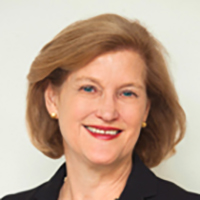
Suzanne Moomaw
Chair and Associate Professor, Urban and Environmental Planning, School of Architecture
Moomaw's research specialty is post-industrial communities, particularly, communities that have depended on manufacturing, extraction, textiles, and agriculture as economic mainstays. On the local and regional scales, she works in Charlottesville on design equity issues and with Southwest Virginia towns on the economic revitalization of their main streets. Nationally and internationally, her research interest is the revitalization ad sustainability of local and regional economies. In 2015, she launched a new project to analyze a subset of the nation’s largest cities beginning in 1956. This research resulted in a book project, Cities Without Work: The Long Road from Boom to Bust (Harvard University Press forthcoming), which situates the 17 post-industrial cities in the United States that had the highest rates of unemployment in 1960 along a fifty-year trajectory. She received the Institute for Advanced Technology in the Humanities Fellowship for 2017-2019 for her Cities Without Work digital project.
John Unsworth
University Librarian and Dean of the Libraries
In June of 2016, John Unsworth was appointed Dean of Libraries, University Librarian, and Professor of English at the University of Virginia. From 2012 to 2016, John served as Vice-Provost for Library and Technology Services and Chief Information Officer at Brandeis University, where he was also University Librarian and Professor of English. In August of 2013, he was appointed by President Obama to serve on the National Humanities Council.
Before joining Brandeis University, John was Dean of the Graduate School of Library and Information Science (GSLIS) at the University of Illinois, Urbana-Champaign from 2003 to 2012. In addition to being a Professor in GSLIS, at Illinois he also held appointments in the department of English and on the Library faculty. At Illinois he also served as Director of the Illinois Informatics Institute, from 2008 to 2011.
From 1993-2003, he served as the first Director of the Institute for Advanced Technology in the Humanities, and as a faculty member in the English Department, at the University of Virginia. For his work at IATH, he received the 2005 Richard W. Lyman Award from the National Humanities Center. He chaired the national commission that produced Our Cultural Commonwealth, the 2006 report on Cyberinfrastructure for Humanities and Social Science, on behalf of the American Council of Learned Societies, and he has supervised research projects across the disciplines in the humanities. He has also published widely on the topic of electronic scholarship, as well as co-directing one of nine national partnerships in the Library of Congress's National Digital Information Infrastructure Preservation Program, and securing grants from the National Endowment for the Humanities, the National Science Foundation, the Getty Grant Program, IBM, Sun, the Andrew W. Mellon Foundation, and others.
His first faculty appointment was in English, at North Carolina State University, from 1989 to 1993. He attended Princeton University and Amherst College as an undergraduate, graduating from Amherst in 1981. He received a Master's degree in English from Boston University in 1982 and a Ph.D. in English from the University of Virginia in 1988. In 1990, at NCSU, he co-founded the first peer-reviewed electronic journal in the humanities, Postmodern Culture (now published by Johns Hopkins University Press, as part of Project Muse). He also organized, incorporated, and chaired the Text Encoding Initiative Consortium, co-chaired the Modern Language Association's Committee on Scholarly Editions, and served as President of the Association for Computers and the Humanities and later as chair of the steering committee for the Alliance of Digital Humanities Organizations, as well as serving on many other editorial and advisory boards.
